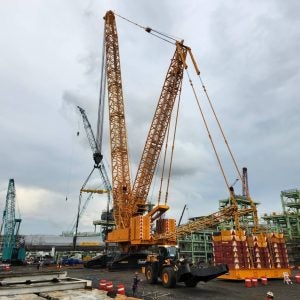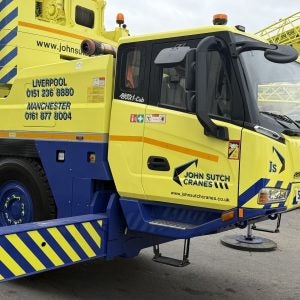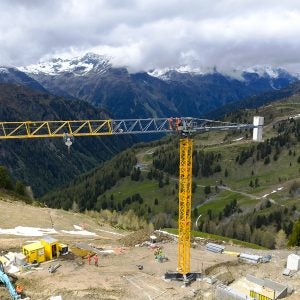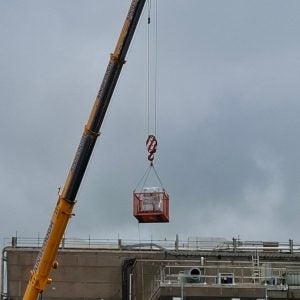Baldwins Industrial Services PLC, the UK crane hire and heavylift contractor, has reported ‘disappointing’ results for the six months to 30 September 2001 and an 80% fall in half year profits from £2.5m to £500,00 (about $700,000). Group turnover for the half year, however, increased by 18% to £41.3m ($58m).
Chairman Richard Baldwin’s full statement follows: ‘Whilst initial trading was satisfactory, overall results for the first half of the year have been disappointing and reflect the need to redress the group’s strategy. Our US business has not performed to expectations and this, coupled with lower UK margins and increased operating costs, including the failure of the Independent Insurance Group plc, has resulted in pressure on working capital.
‘Trading since 1 October 2001 has continued to disappoint. Apart from affecting profitability, the group’s poor performance has led to a breach of one of its banking covenants. The group is currently in discussions with its bankers to increase its facilities and with providers of asset finance to renegotiate the terms of the group’s borrowings to re-profile debt repayment schedules. The group has also embarked on a fundamental review of its strategy with a view to restoring its financial performance.
‘Group turnover for the half year increased by 18% to £41.3m (£34.9m). However, owing to a decline in our gross margin from 38% to 31% and a 21% increase in administrative expenses, operating profits before the sale of fixed assets declined 37% to £3.2m (£5.1m). Profit on the sale of fixed assets amounted to £0.2m (£0.4m) and the net interest charge incurred during the period was £2.9m (£3.0m). Included in the results for the half year are incremental costs of £0.8m relating to the failure of the Independent Insurance Group plc. Consequently profits on ordinary activities before taxation were £0.5m (£2.5m) and, after taking into account an increased effective tax rate for the period of 39% (33%), profits after tax were £0.3m (£1.7m) and earning per share 1.0p (5.6p).
‘Net debt at 30 September 2001 was £86.6m (£84.7m at 31 March 2001) and net assets were £38.0m (£38.0m at 31 March 2001), representing gearing of 228%. The group has adopted FRS 19: Accounting for Deferred Tax, which has caused the adjustment to the prior period reserves amounting to £10.4m. This does not affect the group’s cash position. Gearing excluding this deferred tax adjustment is 179%. Interest cover for the six-month period was 1.2 times.
‘In light of the results, the board has decided to not declare an interim dividend in order to conserve cash in the operations. At this stage, the future dividend policy of the group is under review.
‘As indicated in our trading statement of 2 October 2001, the poor first half performance reflects both a shortfall arising from certain of our UK activities and the ongoing costs of establishing our presence in North America.
‘Trading conditions in the UK crane hire market have been difficult, in particular for our Heavy Cranes division. Turnover of the UK operations for the six months ended 30 September 2001 was up 5% to £30.0m (£28.5m). Operating costs increased significantly, due in the main to higher operator wages, maintenance, repairs, transport, fuel and insurance, all of which are material cost drivers for the business. In response to this, a detailed cost cutting programme has been initiated. A new centralised purchasing department has been established, the depot structure has been rationalised and certain low return assets have been identified for disposal.
‘Delta [tower cranes], Loadtite [lifting gear] and M&E Handling Services, all performed well during the period and continue to make good progress.
‘Our heavy lift contracts in Venezuela were successfully completed earlier than expected. The consequent re-positioning of the cranes resulted in a significant amount of lost revenue as well as abnormal transportation costs. The contract in total has been highly successful.
‘Our US business increased turnover by 71% to £11.3m. Despite this sales growth the business is not achieving acceptable returns and operational costs have been higher than originally planned. We have experienced a significantly large number of technical, mechanical and electrical breakdowns with new cranes and this has had a major impact on operating performance; consequently two depots have been closed (Memphis and Longview).
‘Recently the US business has won several significant heavy lift contracts. The focus on heavy lift contracts continues but with a more aggressive approach towards profitability.
‘Shareholders’ funds as at 30 September 2001 were £38.0m (£38.0m as at 31 March 2001). Borrowings were £86.6m (£84.7m as at 31 March 2001). The group has high operational cash outflows and has decided that it needs to re-profile its loan repayment programme. Discussions to resolve this are ongoing with the group’s major finance providers, all of whom have indicated a desire to support the group in the long-term. Due to the large number of parties involved, it is expected that these discussions will take several weeks to resolve.
‘The group has added 20 new cranes of various sizes to the fleet, which now consists of 465 small, heavy and tower cranes. These additions reflect commitments made earlier in the year. Future strategy does not require significant additional capital expenditure beyond that already committed to at this time.
‘Additions to fixed assets in the half-year amounted to £8.6m (£15.0m). We invested £7.9m (£13.2m) on the hire fleet and £0.7m (£1.8m) on property, vehicles and information technology. The depreciation charge for six months is £7.0m (£5.2m).
‘The group has grown in size very rapidly over the last 5 years. The current strategy recognises the need for a period of consolidation. In the UK, we will concentrate on the tight control of the core UK business and maximising the utilisation of the current crane fleet. Growth will continue in the non-crane related businesses, all of which have excellent market opportunities. We continue to be the UK’s leading supplier of heavy cranes and our focus will remain on marketing our strength and technical expertise in this area.
‘In the US, we will concentrate in two areas. First, our local urban and power based customers will be served from a network of 5 depots. Second, we will maximise the Baldwins’ heavy lift contracting brand to win prestigious contracts throughout the continent. Indeed, we have already secured substantial new business for next year, which will provide a strong platform for the future. Further cost reduction is ongoing to ensure that the business operates from the most efficient base.
‘This reorganisation, both financial and operational, is well underway, and is expected to provide significantly improved returns in the next financial year. The appointments made to the business during the first half of the financial year have strengthened our team and will have a positive impact on the future performance of the business. Rick Barnett was appointed our UK managing director, Andrew Somerville as our group finance director and William C Creighton II has been appointed business leader of our US operations. We welcome them all.
‘I believe that the action we have taken and plan to take to improve the operating performance of the group will begin to show through in the underlying trading performance towards the end of the second half of the year. However, it will be in the following financial years that the full impact will be realised. Our UK market position remains strong, and the sectors in which we operate in both countries show no major signs of decline, indeed the US power and energy sector remains particularly buoyant.’






